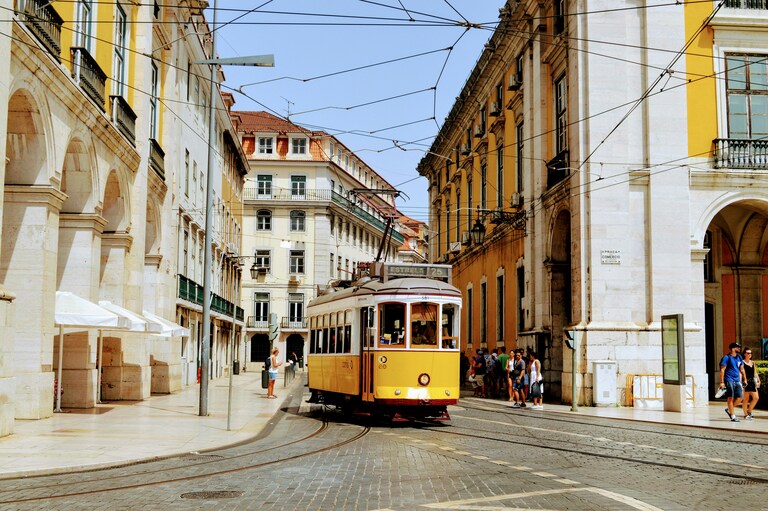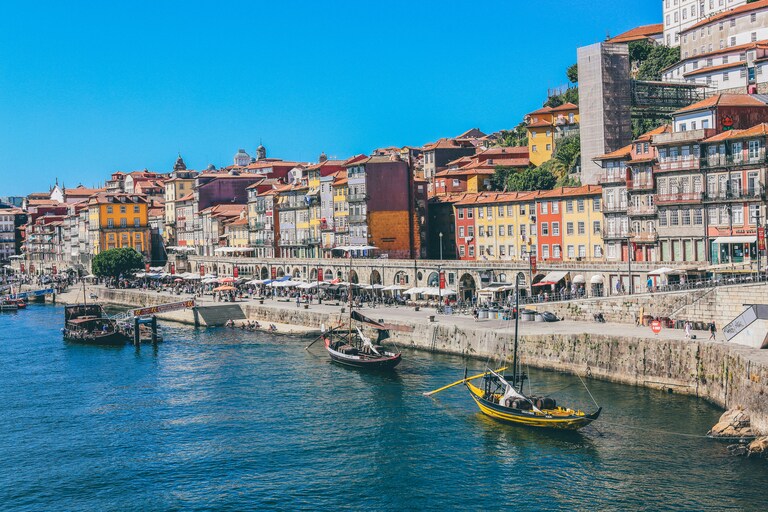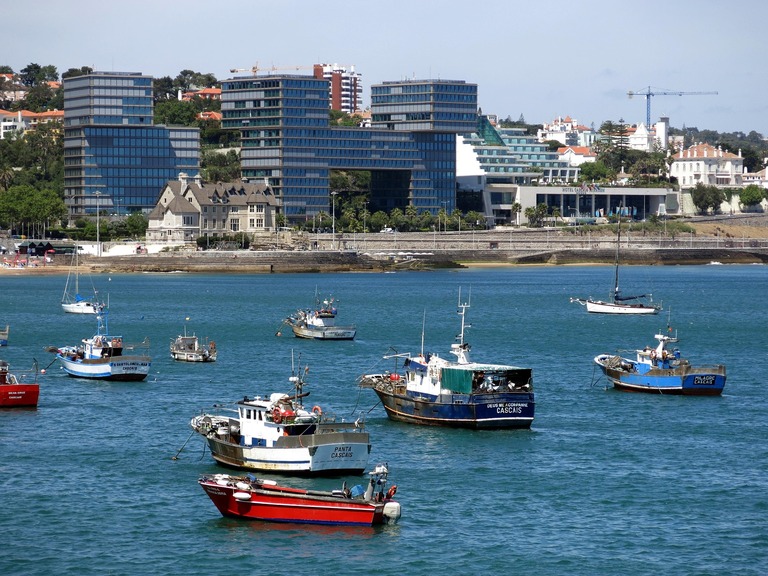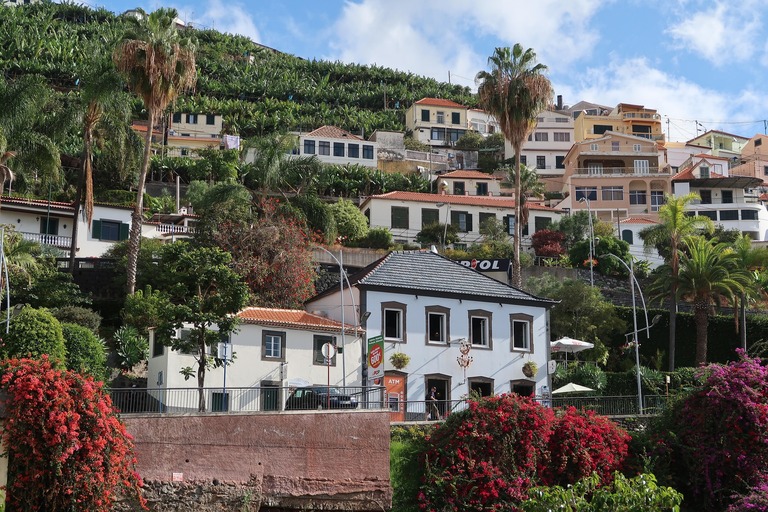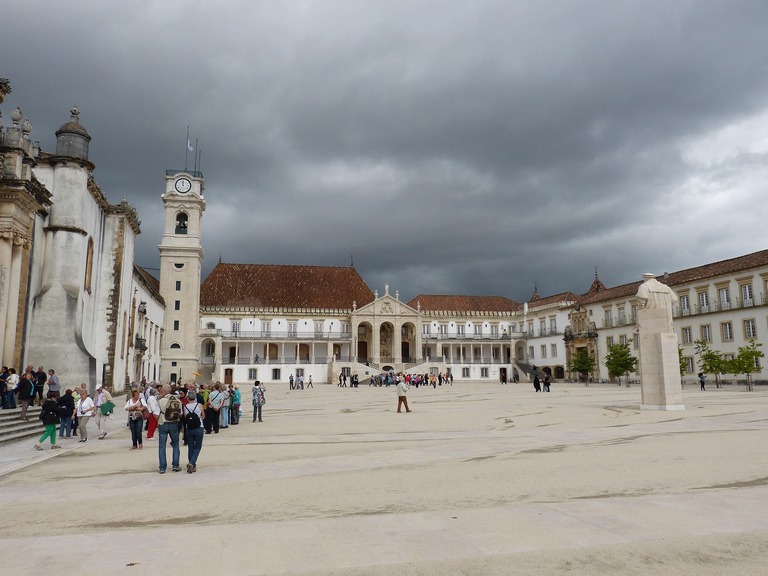Best places to live in Portugal for expats: where lifestyle meets opportunity
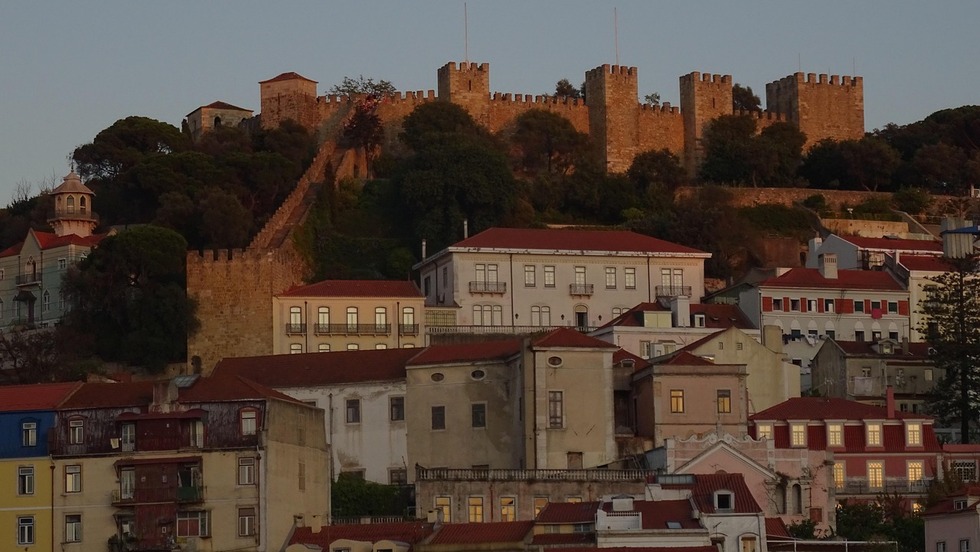
With year-round sunshine, affordable living, and one of the safest environments in Europe, Portugal continues to attract Americans seeking a better quality of life abroad. April 2025 AIMA reports show that the country issued 33.6% more residence permits than the previous year, lifting the registered foreign population to 1.1 million people – 15% of the total.
These statistics have inspired many American professionals, remote workers, and retirees to consider relocating – and to start exploring the best places to live in Portugal.
That is why this guide explains what matters most – and pinpoints where lifestyle meets opportunity, by highlighting the top destinations and what makes them ideal for expats.
Factors expats should consider before choosing Portuguese cities
Choosing the right city in Portugal isn’t just about scenery – it’s about aligning your lifestyle, finances, and long-term goals with the realities of each area. Before picking an area, weigh these six essentials:
- Cost of living – Lisbon’s 2025 Cost-of-Living Index is 51.5, while Braga’s is just 43.8, meaning everyday prices can be 15% lower outside the capital. This difference impacts everything from rent and groceries to leisure spending
- Job and business opportunities – Porto is home to 139 startups – around 18% of Portugal’s total – and ranks as the country’s second-strongest startup ecosystem, with a 16.4% annual growth rate. Tech, tourism, and renewable energy are major sectors drawing international talent.
- Quality of healthcare and education – Porto scores a high 78.9 on Numbeo’s Health Care Index, and Lisbon has 17 accredited international schools. Access to English-speaking doctors and IB-certified schools is a key draw for expat families.
- Language barriers – English speakers find Portugal welcoming; Portugal ranks very high (6th globally) on EF’s English Proficiency Index, with younger adults scoring strongest. However, basic Portuguese helps with paperwork, service providers, and social integration.
- Safety and infrastructure – Both Lisbon and Porto sit inside the global top-100 safest cities with Safety Index scores of 68.7 and 67.1, respectively. Portugal also has reliable public transport, modern airports, and growing EV infrastructure.
- Lifestyle preferences – Surf suburb Carcavelos offers beach commutes, Coimbra’s heritage town centers on academia, and inland Évora trades nightlife for wine-country calm. Whether you're an urbanite or a nature lover, there's an area that fits your rhythm.
Expat communities and international vibe
Portugal is home to a range of well-organised expat communities, making it easy to form social and professional networks from day one.
- Nation-wide networking – The 30,000-member Americans & Friends in Portugal Facebook group answers daily questions on visas, housing, and schools.
- Cascais connections – International Women in Portugal runs weekly brunches and interest groups that attract more than 120 members to the Lisbon–Cascais area.
- Porto meet-ups – The Americans in Portugal Meetup group hosts monthly language-exchange and networking events that regularly pull 200+ participants, offering newcomers an instant circle.
With groups like these – and dozens more on Slack, WhatsApp, and Discord – you’re rarely more than a click away from a ready-made support network wherever you decide to settle.
Best cities in Portugal for expats
Can’t decide which area fits your goals? Imagine asking yourself: Do I crave café culture after Zoom calls, or sunrise paddle-outs before kindergarten drop-off? The answer points you toward one of these seven hotspots.
Lisbon – the capital of culture and business
Lisbon isn’t just Portugal’s capital – it’s the country’s heartbeat. Picture Roman ruins beside modern fintech towers, a pastel de nata in hand as you walk past coworking spaces buzzing with startups. With 1 Gbps Wi-Fi, Europe-wide HQs for companies like Google and Revolut, and 17 international schools including the British School of Lisbon and Redbridge, it’s a magnet for ambitious expats and digital nomads.
Lisbon, Portugal. PIXABAY
But there’s a price to pay. A one-bed in the city center averages €1,430, and luxury properties face steep IMI and AIMI property taxes. Cruise-season crowds flood the old quarters, and long-term leases often require a two-to-three-month deposit. Lisbon offers energy and opportunity – but only if you’re ready to budget for the lifestyle.
Braga – for a quieter, traditional Portuguese life
Braga is where centuries-old tradition meets digital innovation, offering a peaceful yet connected life outside Portugal’s major metros. It’s ideal for families, early retirees, or anyone craving authenticity without isolation.
Braga, Portugal. PIXABAY
- Old-meets-new – Braga’s skyline alternates between 18th-century churches and tech startup hubs, with Sunday farmers’ markets that feel untouched by time.
- Affordable and family-friendly – Rents and childcare are about 20% cheaper than in Lisbon, often with garden space included.
- Integration required – Outside the city core, English fades quickly. Learning basic Portuguese can unlock better rental terms, local friendships, and more authentic experiences.
- Well-connected peace – You’re just 45 minutes from Porto Airport, offering US access without sacrificing Braga’s provincial calm.
Braga may not have Lisbon’s buzz or Porto’s riverfront glamour, but it offers something more enduring – space to breathe, raise a family, or simply enjoy life at your own pace. For expats seeking tradition with just enough tech and travel access, Braga is a quiet contender worth serious consideration.
Porto – charm, wine, and a slower pace
Baroque cathedrals, tiled façades, and the scent of aging port wine define Portugal’s second city. Porto feels like a Renaissance painting brought to life – intimate yet ambitious, with a creative buzz that flows from its riverside cafés to its tech incubators in Matosinhos.
Porto, Portugal. PIXABAY
Rent is 20–25% lower than in Lisbon, averaging €1,030–€1,200 for a city-center one-bed. Healthcare scores higher than in the capital, and the expat scene is growing steadily. Still, the foggy winters, just two international schools, and occasional flooding remind you that Porto’s beauty comes with seasonal quirks.
Cascais – upscale living by the sea
Cascais blends seaside elegance with practical perks, offering a relaxed pace just a short hop from Lisbon. Known for its cosmopolitan flair and family-friendly atmosphere, it’s one of the most desirable – and most expensive – coastal suburbs in Portugal.
Cascais, Portugal. PIXABAY
- Easy access to Lisbon – A 30-minute train or drive links you to the airport and city, while your mornings can start with paddle-boarding at Praia da Rainha.
- Top-tier education – Cascais boasts elite international schools like St. Julian’s and the American International School of Lisbon, just minutes from family-friendly neighborhoods.
- High-end housing – A three-bed villa can easily top €4,700/month, and energy-efficient builds may offer IMI tax rebates.
- Balanced lifestyle – Thursday art walks, a weekly organic market, and marina-side dining deliver a sense of community – if you can tolerate the Marginal traffic during summer.
Madeira & Azores – island life for nature lovers
Madeira and the Azores offer wild beauty and remote work incentives that are hard to match. In Madeira, a 5% corporate tax rate (until 2028) has drawn crypto and SaaS founders, while the Digital Nomad Village has welcomed nearly 20,000 participants since 2021.
Madeira & Azores, Portugal. PIXABAY
But paradise has its price. Direct US flights are seasonal, inter-island travel adds cost and time, and you’ll need mainland referrals for many specialists. Still, for expats who value whale-spotting over Wi-Fi speeds – or year-round hiking over city traffic – the payoff is unmatched.
Algarve – paradise for retirees
The Algarve is more than a postcard – it’s where life slows down under the sun. From Lagos to Faro and Tavira, retirees and remote workers bask in 300+ sunny days a year, affordable health insurance, and well-developed English-speaking clinics.
Algarve, Portugal. PIXABAY
A one-bed in Faro averages €980, and golf discounts, mild winters, and an expat population exceeding 30% make it incredibly welcoming. But tourism can stretch resources thin – expect short-term rental surges, higher deposits, and limited nightlife off-season. Still, if warmth and wellness matter most, it’s hard to beat.
Coimbra – ideal for students and budget-minded expats
If you want a slower, intellectually rich environment without breaking the bank, Coimbra checks all the boxes. With a strong academic vibe and affordable cost of living, it's perfect for remote workers, researchers, and retirees seeking cultural depth.
Coimbra, Portugal. PIXABAY
- Academic legacy – As Europe’s ninth-oldest university town, Coimbra blends intellectual energy with cultural charm. Enjoy lively cafés, free Portuguese language courses, and intimate fado concerts under medieval arches.
- Cost-effective living – Rents dip near €660, meals rarely pass €12, and fibre-optic broadband supports a strong remote work culture.
- Low-pressure pace – Career roles are limited outside academia, but Lisbon is just 1 hour 40 minutes away by rail for business meetings or weekend escapes.
Each of these destinations offers something distinct – fast-track careers in Lisbon, vineyard serenity in Porto, coastal luxury in Cascais, endless sunshine in the Algarve, academic charm in Coimbra, budget comfort in Braga, and island adventure in Madeira or the Azores.
Weigh your budget, climate preference, family needs, and tax position, then shortlist two or three spots for an in-person scouting trip.
Remember, Taxes for Expats is here to untangle your IRS tax questions so you can focus on making Portugal home.
Cost-of-living comparison table
Day-to-day expenses still beat Western European averages, but variations between each area can reshape a budget.
| City/Region | Rent 1-bed City Centre € | Groceries Index | Monthly Pass € | Health Care Index |
|---|---|---|---|---|
| Lisbon | 1,430 | 47.6 | 40.0 | 72.6 |
| Porto | 1,029 | 43.8 | 46.3 | 78.9 |
| Faro (Algarve) | 983 | 45.0 | 40.0 | 74.0 |
| Coimbra | 659 | 47.1 | 35.0 | 76.0 |
| Braga | 753 | 43.0 | 46.3 | 78.8 |
| Funchal (Madeira) | 850 | 48.0 | 46.0 | 77.0 |
(Cost of living figures below are pulled directly from Numbeo’s August 2025 dataset.)
Should you buy or rent in Portugal’s top expat areas?
After comparing cost-of-living tables, many expats still wonder: Is locking in a mortgage smarter than paying rent? The answer depends on your horizon, cash flow, and tolerance for bureaucracy.
- Buying offers stable payments and allows deferral of capital gains tax if reinvested in another Portuguese home within 36 months.
- Expect 68% in upfront buying costs, including IMT up to 7.5%, 0.8% stamp duty, and legal fees.
- Renters enjoy flexibility, capped annual increases tied to inflation, and easier short-term commitments.
- Some landlords require six-month deposits, and coastal town rentals become scarce during peak seasons.
- Foreigners can freely buy property, but should avoid pitfalls like unlicensed agents, missing habitation licenses, and hidden condomínio debts.
Navigating Portugal’s tax landscape – what US expats must know
After you have chosen the area you want to reside in when you move to Portugal, keeping track of a few extra tax-centric checkpoints can save you money – and headaches – down the road.
- Tax residency test – Spend 183+ days in Portugal or maintain a habitual abode, and you become a Portuguese tax resident; plan travel days so you do not trigger residency earlier than intended.
- Get a NIF first – Your Número de Identificação Fiscal is required to open a bank account, sign a lease, or be added to a home utility bill; without it, you cannot even file a return.
- Watch AIMI thresholds – High-value real estate above €600,000 may trigger Portugal’s additional wealth tax (AIMI) every June.
- Rental income is taxable – If you lease out your property, Portugal levies a default 25% withholding, while the US taxes net income after foreign credit; keep receipts for allowable deductions.
- State taxes may linger – Some US states, like California and Virginia, are hard to shake; document your non-residency once you establish Portuguese domicile.
Do not forget that US citizens abroad must still file federal returns by 16 Jun 2025 (default extension), and payments are due 15 Apr. Need until 15 Oct? File Form 4868 – or use our free tax extension service.
Ready to make the move? Portugal is waiting
From surf-ready Cascais to history-soaked Coimbra, the best places to live in Portugal balance sunshine, safety, and soft-landing visa routes. Scout each area in person, sample the cafés, and test the Wi-Fi before signing a lease. D7 passive-income visas, Digital-Nomad (D8) permits, and the tech-fund Golden Visa all open doors – but taxes can still trip you up.
At Taxes for Expats, we help Americans abroad navigate IRS requirements, avoid double taxation, and make the most of their international lifestyle. With our expert guidance, you can settle in Portugal with clarity – and stay focused on building your best life abroad.

Greater Lisbon and the Algarve host the largest American expat communities, each exceeding 8,000 residents.
Yes – major cities and resort towns have high English proficiency, but basic Portuguese accelerates integration.
Roughly two-thirds of under-40s are English speakers, with higher rates in tourist areas.
Overall living costs are 32.5% lower, and rents are 39.4% lower, than the US average.
The Algarve’s mild winters and robust healthcare top most retirees' wish-lists.
Tech, tourism, and renewable-energy sectors actively recruit international talent.
Start on Idealista.pt, Facebook expat communities, and local realtor chains – most listings specify neighborhood and furnish-status.
Portugal ranks 44th globally for Health Care Index, and private plans start around €60/month.
D7 (passive income), D8 (remote work), Startup Visa, and the Golden Visa fund path all lead to five-year residency.
Yes – weekly meetups in Caldas da Rainha and Nazaré prove network effects extend far beyond the big cities.




